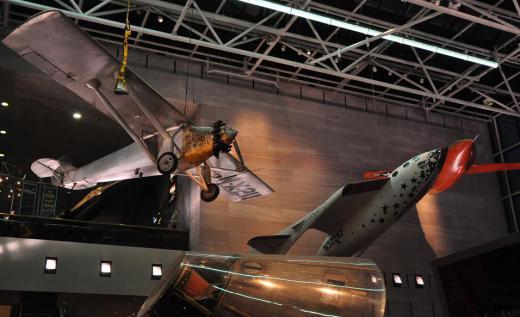Since the self-financed visit of Dennis Tito, an American investment manager and former employee at the NASA Jet Propulsion Laboratory, to the International Space Station in 2001, the field of private spaceflight has seen exciting progress. Every year there is another milestone, and no doubt this article will become out-of-date as time progresses. Still, we seek to describe the progress in private spaceflight that has been achieved as of November 2008.
One of the most important historic moments in private spaceflight was achieved on 21 July 2004, when SpaceShipOne, a 5 m (16.4 ft) wingspan spacecraft built by Burt Rutan's Scaled Composites, ascended past 100 km (62 mi) altitude, the international definition of space. The craft reached this altitude in two separate flights over a two week period. It set numerous records, including the first privately funded manned craft to reach space, and the first privately funded craft to exceed Mach 2 and 3. Though making a spacecraft capable of reaching orbit requires about 60 times as much energy as just reaching space, this is the first step to privately funded space tourism and exploration.

Later that same year, in December 2004, the owner of Virgin, Richard Branson, announced that he was licensing the SpaceShipOne design for Virgin Galactic, a new space tourism company based in New Mexico. The company is building a fleet of five craft and plans to begin offering flights in 2010, pending extensive testing for safety. The flights will cost $200,000 US Dollars (USD) each. Over a hundred spaceflight enthusiasts have already signed up, including celebrities like William Shatner and Sigourney Weaver.

On 12 July 2006, there was another major milestone when Bigelow Aerospace launched Genesis I, an experimental private space habitat. This was the first private space station in history. On 28 June 2007, Genesis II was launched. The founder of Bigelow Aerospace, Robert Bigelow, has offered a $50 million USD "America's Space Prize" to the company that can develop a reliable and safe orbital launch vehicle for commercial spaceflight to a orbiting hotel.

On September 28, 2008, after three failures, another milestone was achieved, the first orbital rocket launched by a private company, Falcon 1. The company that builds Falcon I, SpaceX, aims to provide rockets for $7-8.5 million USD a pop, which is relatively cheap in the world of space flights. The company is also developing the Dragon capsule, which it says will eventually be used to launch human crews into orbit on the Falcon rockets. Demonstration flights will be held between 2008 and 2010, and NASA is placing their hopes on SpaceX to come up with a launch system that can deliver astronauts to the International Space Station after the Space Shuttle program is decommissioned and before the Orion Crew Vehicle is developed.
Michael is a longtime WiseGEEK contributor who specializes in topics relating to paleontology, physics, biology, astronomy, chemistry, and futurism. In addition to being an avid blogger, Michael is particularly passionate about stem cell research, regenerative medicine, and life extension therapies. He has also worked for the Methuselah Foundation, the Singularity Institute for Artificial Intelligence, and the Lifeboat Foundation.
